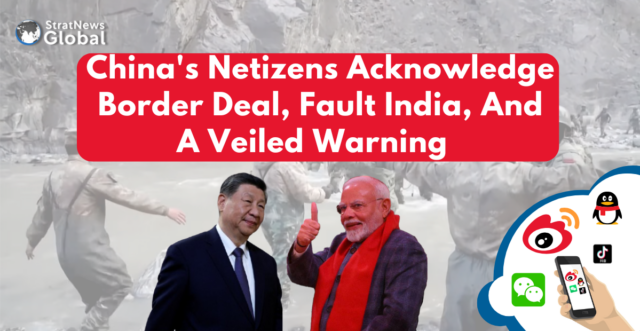China’s social media platform Weibo garnered a staggering 46 million hits when the news broke about a deal with India on the border (#India and China Reach a Solution on the Border Issue).
A commentary by 1002 Shenme (Screenshot Below), a known anti-India activist on Weibo since 2021, went like this:
“I believe most people are unaware of the background and details of this region. To put it simply, for the past four and a half years, India has unilaterally set conditions, requiring our country to withdraw from the area as a prerequisite for the two nations to return to normalcy.
Our country has steadfastly refused for over four years, but now we have largely agreed to India’s demands. Given this significant concession, the focus should perhaps be on why it was made and what was gained in return, rather than on the size of the concession itself.
Some say it’s because the Indian military in the “Eastern Command” granted reciprocal patrolling rights, some believe it’s related to the BRICS new settlement system, while others suggest it was done to prevent India from getting too close to the U.S.”

Another comment on QQ.com, an instant messaging, software service and web portal went like this:
“China and India signed an agreement on the border issue, removing the ‘biggest stumbling block’ to restoring relations.
Four years after refusing, we acceded to India’s demand. Whether this demand is fully fulfilled or not, whether we have imposed additional conditions, the result is that we will evacuate our outposts in these two areas, as India wishes. The total area is 972 sq. km, as India says.
It is doubtful whether the outpost in Xidagou (or Jiwan Nala which flows from Aksai Chin to Ladakh), will be evacuated. The other area is more than 100 sq. km. India’s External Affairs Minister S Jaishankar said, “The situation before 2020 has been restored.”
An analysis on Netease.com, which focuses on content, communications and commerce, posted by a verified netizen is titled:
“Modi bows his head, India softens China!
An agreement was reached on the Sino-Indian border issue, and the two sides agreed to return to the status quo ante in 2020. Secondly, Modi’s attitude towards the BRICS has also begun to soften, and he even attended the BRICS summit in person. For India, which has always taken a tough and frequently provocative attitude on the border issue, this series of “compromises” is really incredible. So, what is the reason for India’s sudden change of face? What is the calculation behind India’s softening?
Every time he stirs up trouble on the Sino-Indian border, Modi can always incite anti-China sentiment at home and win votes.
India’s compromise also seems to indicate that the Modi government is realising that instead of continuing to be a “pawn” of the West, it is better to truly integrate into the trend of global multipolarity.”
The last mention is taken from the Global Times, the English-language mouthpiece of the Communist Party of China. It is titled “India China reach resolution on issues concerning the border areas.”
Lin Minwang, deputy director at the Center for South Asian Studies at Fudan University, told the Global Times on Tuesday that “Undoubtedly, this is a very positive signal for the future development of China-India relations.”
The resolutions reached by the two sides marked a breakthrough in resolving the border issues that started in 2020, Lin Minwang said.
“In the past, India has always said bilateral ties cannot be normalised if the border issue remained unsolved, but now New Delhi should not use the border issue as a pretext to bar the improvement of bilateral ties.”
Don’t miss the thinly veiled warning in the last line. This is important given the limited information put out by official Chinese agencies on the border deal with India. Beijing’s take was that the two sides “had reached a solution” following “close communication on the relevant issue of the China-India border through diplomatic and military channels.”
China’s Foreign Ministry spokesman Lin Jian said at the regular briefing on Tuesday that Beijing “positively evaluates” the solution reached and would “work with India to implement the above solution.” No details were provided.
Reading the comments on social media, it would appear that the mandarins in Beijing do not want to give the impression this deal is of any great significance. China would not want to be seen giving in to India. After all, the asymmetry in economic and military power between the two countries is obvious.
China may be seeking to convey the impression that as the bigger power, it has shown goodwill towards India. It has taken in its stride India’s refusal to expand the relationship to broader areas until the status quo on the border is restored. That having been done, China can be expected to press its case on “broader areas”, which means restoring the economic and trade relationship. One waits to see how India navigates the way forward.
Research Associate at StratNewsGlobal, A keen observer of #China and Foreign Affairs. Writer, Weibo Trends, Analyst.
Twitter: @resham_sng





